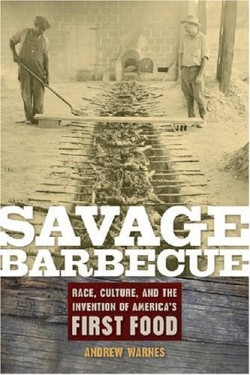Savage Barbecue
Race, Culture, and the Invention of America's First Food
“Wherever people take flight from civilization or seek fleeting shelter from it, it comes to surface. Wherever people covet the thrill of the barbaric or yearn for outdoor freedoms, this food, rhizomatic and protean, undergoes another repositioning, another reinvention, embedding itself into diverse human cultures otherwise opposed,” Warnes writes.
What food other than barbecue could feed such a vast hunger?
Unlike most books about barbecue, Warnes’ concern is not with techniques, but rather the concept of barbecue and how it resonates in English and American culture. The bulk of the book is dedicated to establishing how the word “barbecue” came into existence, challenging even the Oxford English Dictionary and tracing its mutation from a noun for a simple Native American structure for grilling fish to a verb which carries connotations of cannibalism and savagery.
It then explores how barbecues were adopted by Western cultures, in part helping to define racial lines: “Invented and exaggerated, held tight in perennial repulsion, barbecue belonged to this new cultural compulsion to pit English gentlemen against the barbaric world beyond Europe.” Subsequent analysis covers how barbecue came to be deeply rooted in African American culture, why it is linked with the frontier and even how the election day barbecue came to be.
The few illustrations serve to elucidate the willful manipulation of barbecue by the Western eye. For example, a 1585 painting shows the rudimentary Algonquian structure for grilling fish which is subsequently reimagined as a frame for torture. In “A Tupinambán Cannibal Feast,” from 1592, an identical grill is enlarged and laden with roasting human parts.
Warnes is the author of Hunger Overcome: Food and Resistance in Twentieth-Century African American Literature and Richard Wright’s Native Son: A Critical Guide. He is a lecturer in American Literature and Culture at Leeds University. Warnes says his research focuses on “the ways in which Western cultures produce the idea of race and turn it into an invisible or otherwise ‘normal’ part of everyday life.”
This is a rigorously researched and argued cultural, literary, and etymological study. While most useful to those interested in how language creates reality, serious barbecue enthusiasts might also appreciate its uncommon angle. Though Warnes sometimes overindulges the academic’s enthusiasm for microscopic analysis, it is nevertheless fascinating to learn how the bite in ’cue comes not just from its sauce but from a creation basted in oppression, fear, and myth.
Disclosure: This article is not an endorsement, but a review. The publisher of this book provided free copies of the book to have their book reviewed by a professional reviewer. No fee was paid by the publisher for this review. Foreword Reviews only recommends books that we love. Foreword Magazine, Inc. is disclosing this in accordance with the Federal Trade Commission’s 16 CFR, Part 255.

